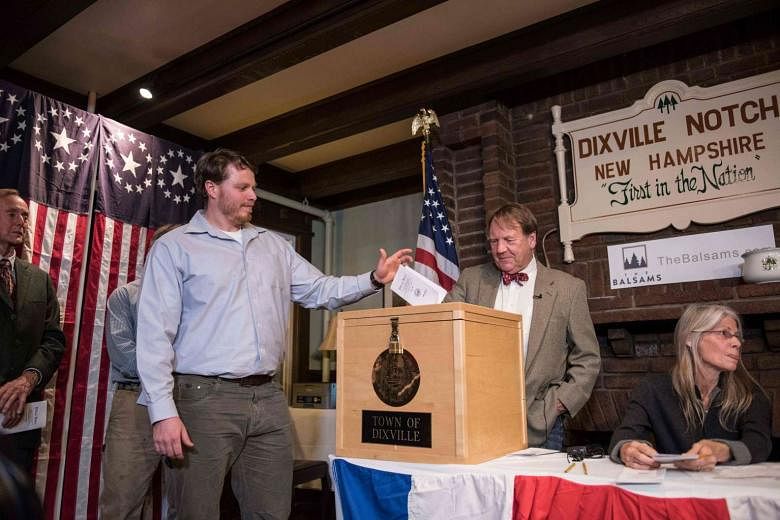When the United States Supreme Court struck down parts of the 1965 Voting Rights Act in 2013, Chief Justice John Roberts argued that some of its safeguards against minority voter suppression were no longer needed because "our country has changed" since the law was passed.
From advances in technology to old-fashioned challenges at the ballot box, The Straits Times unearths four electoral actions you might be surprised to know are legal.
1. VOTE TRADING
The #NeverTrump movement isn't so much for a particular candidate as staunchly opposed to Republican nominee Donald Trump winning the presidency.
But some swing-state supporters of third-party candidates fret that voting for Libertarian Gary Johnson or Jill Stein of the Greens would be as good as throwing their vote away.
Other voters in firmly blue states are no fans of Democratic candidate Hillary Clinton but are convinced that their home states would go for Mrs Clinton come hell or high water.
Websites and apps have sprung up for these two groups of voters to "trade votes" so that they can vote with clean consciences and feel that they are not responsible for paving Mr Trump's way to the White House.
Like in online dating, prospective voters can even chat with one another before pledging to vote for the other's preferred candidate.
This practice may sound dodgy, but a federal appeals court upheld its legality in 2007 as a form of First Amendment-protected free speech.
2. USING YOUR PHONE
Caveats are needed when it comes to the millennial practice of taking a picture in the voting booth.
This controversial act shot to public attention when pop star Justin Timberlake, in a bid to encourage fans to vote, posted a photo on Instagram showing himself in a Memphis, Tennessee, voting booth.
As with many things in the federal republic of the United States, the legality of the "ballot selfie" varies from state to state.
Timberlake found himself in violation of Tennessee law, although local authorities declined to pursue the matter.
Some states prohibit any videography or photography in the polling district, but may leave loopholes for photographs of mail-in ballots. And in other places, like Illinois, it is a felony to show your marked ballot to anyone else.
What about the use of smartphones in the voting booth?
Again, this varies between states. Voters in Delaware, Iowa, Maryland, Tennessee, Texas, and West Virginia cannot use their phones while voting.
Other states allow voters to use their phones to look up information while filling out what may be lengthy ballot forms covering weighty issues like the death penalty.
3. CHALLENGING OTHER VOTERS
Many states allow citizens to contest one another's right to the franchise at the polls - as many as 39 states, New York University says. The practice is barred in other states, including the swing state of Ohio.
Voter challenges must be made in good faith, and can be based on questions about the legitimacy of a voter's residency, age or citizenship.
But fewer than half of the states that allow for voter challenges require the challenger to provide evidence to support their claims of another voter's illegitimacy.
Depending on the laws of a particular state, challenged voters may be unable to vote without taking an oath, or may have to cast a provisional ballot.
4. STAYING IN LINE
On Saturday (Nov 5), Nevada's Republican party chair accused polling stations of staying open after hours "so a certain group could vote".
Mr Michael McDonald was referring to a Mexican grocery store in Nevada, Cardenas Market, where early voters were allowed to cast their ballots until 10pm. Latino voters in Nevada are expected to largely vote Democratic.
However, local authorities clarified that the polling station had not extended its hours - it was merely ensuring that voters who had been waiting in line at the hour that polls closed were all still able to vote.
It is generally understood that voters have the right to complete the voting process as long as they are in the line for the polls, even if the official closing time has passed.


